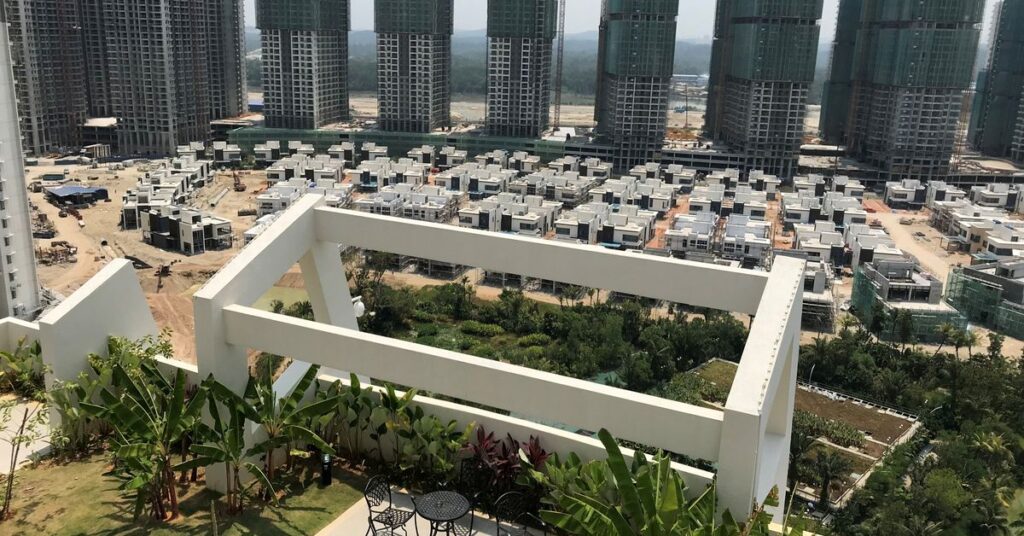[1/3]Residential buildings are seen at Forest City in Johor, Malaysia, August 20, 2018. Picture taken August 20, 2018. REUTERS/Fathin Ungku/File Photo Acquire Licensing Rights
HONG KONG, Sept 18 (Reuters) – Embattled Chinese property developer Country Garden (2007.HK) faces yet another liquidity test with Monday’s deadline to pay $15 million in interest linked to an offshore bond, after having dodged default at the last minute twice this month.
Country Garden, whose financial woes have worsened the property sector outlook and spurred a raft of support measures from Beijing, will have a 30-day grace period to pay the coupon before it is considered in default.
The $500-million, 6.15% bond matures in Sept. 2025. The coupon payment had not been received by late afternoon on Monday, said one holder of the bond tranche, who sought anonymity as they were not authorised to speak to media.
If Country Garden fails to pay the coupon before the grace period ends in mid-October, the principal will become due and any failure to service will trigger cross-default terms, said Sandra Chow, co-head of Asia-Pacific research at CreditSights.
“It’s going to be really hard,” for Country Garden to meet debt obligations due to its tumbling cash levels at a time when property sales in the world’s second-largest economy remained very weak, Chow said.
A Country Garden spokesperson did not respond to a Reuters request for comment about its latest debt repayment obligation.
Shares in Country Garden, one of the few large Chinese developers that have not defaulted on debt obligations, ended down nearly 2%, outstripping a fall of 1.4% in the benchmark index (.HSI).
Last month, the company warned of default risks if its financial performance continued to deteriorate. It has debt of 108.7 billion yuan ($14.9 billion) due within 12 months but only about 101 billion yuan in cash as of June.
It avoided default by securing creditors’ approval to extend payments for an onshore private bond, a major relief for the embattled Chinese developer as well as the crisis-hit property sector.
In August the developer missed coupon payments of $22.5 million tied to two dollar bonds but managed to wire funds before a grace period ended this month, dodging a default.
Last week, onshore bondholders approved three-year extension of repayments on seven other Country Garden bonds.
Many creditors believe Country Garden will have to restructure its offshore debt if it does not get liquidity support soon.
Some offshore creditors have started talks with New York-based law firm Kobre & Kim LLP and London-based Ashurst and are looking at forming groups if the developer seeks to restructure debt.
STATE SUPPORT
China has rolled out support measures to help revive the property sector, which accounts for roughly a quarter of its economy and has been reeling from an unprecedented liquidity crisis since 2021.
Still, a survey report by JPMorgan last week showed investors’ biggest concern was “ineffective” policy response, followed by a spillover into the banking system, and a double dip in property sales.
The survey of Chinese and global investors also showed the worst of the property crisis has not yet passed.
In a sign of Beijing’s efforts to contain spillover risks, two state-owned financial firms have been roped in to provide operations and management support to troubled shadow bank Zhongrong International Trust Co.
Zhongrong, which traditionally had sizeable real estate exposure, missed payments on dozens of so-called trust products since late July, roiling markets and fuelling fears that the property sector crisis could threaten the financial system.
It was not immediately clear if authorities had engineered the support by the two firms, but Beijing has previously bailed out troubled financial firms by roping in state-owned entities to contain broader contagion risk.
On Friday, China’s financial regulator also approved the setting up of a new state-backed insurance company, Hai Gang Life, to take over the assets and liabilities of the insurance unit of defaulting developer China Evergrande Group’s (3333.HK).
The new firm will safeguard the interest of the unit’s customers and creditors during the transition to the state-backed company, the regulator said in a statement.
A debt default late in 2021 by Evergrande, the world’s most indebted property developer, which has become the poster child of China’s property crisis, triggered a string of defaults at other builders.
Reporting by Xie Yu in Hong Kong; Editing by Sumeet Chatterjee and Lincoln Feast.
: .


